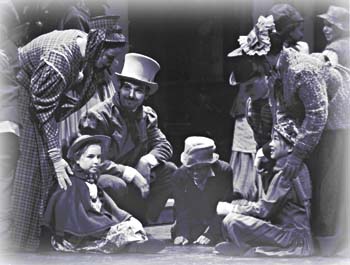![[Metroactive Stage]](/stage/gifs/stage468.gif)
![[Metroactive Stage]](/stage/gifs/stage468.gif)
[ Stage Index | Metro | Metroactive Central | Archives ]
Enticing Tragedy
 Scott Hinrichs Background Drama: The demimonde denizens of Opera San José's "La Bohème." Opera San José Production renews our appreciation of Puccini's emotional gift By Philip Collins PUCCINI'S La Bohème is a most enticing opera. It captures life budding out--with laughter, zeal and flowering love affairs--only to steal it all away by the fourth act. There is not a sweeter tragedy in all of opera literature, none that cuts with so fine a double edge. Puccini and his librettists, Giuseppe Giacosa and Luigi Illica, created a marvelously lifelike world in La Bohème, where emotions are as complex as the events that shape them. The opera's ongoing segues between horseplay and pathos fuse the two extremes into complementary halves. Along with sadness for the passing of Mimi (the young heroine), La Bohème will also leave one with renewed appreciation for the gift of life. At least a good production will do so, and Opera San José's current staging of La Bohème hits right on the mark. Stage director Daniel Helfgot and conductor David Rohrbaugh offer a polished collaboration that balances the work's tender and jubilant aspects in splendid accord. Cast and orchestra conspire closely to bring off the score's gestural graces, and the ingenuities of Giacosa and Illica's lyrics areattentively served (supertitles help). The plot of La Bohème is no great shakes, a kind of slice-of-life yarn. The events experienced by the story's four male comrades--Marcello the painter, Rodolfo the poet, Colline the philosopher and Schaunard the musician--and two women--Mimi and Musetta--are not exceptional. As characters, however, they are inimitable; what happens to them means a great deal. They paint, write poetry, philosophize, avoid paying rent and fall in love. Such are the lives of the young and restless. The cast (which alternates) for Saturday's opening performance created a coterie of characters that was impossible not to care about. Andrew Eisenmann, John Bellemer, Clifton Romig and Brian Carter set the evening off in good step with sure comedic chemistry and wonderful singing. As the poet Rodolfo--the romantic foil for Mimi--artist-in-residence Bellemer gave a performance that was moving and artful. Never has his voice sounded so richly textured and focused. When in the thick of buffoonery with his comrades, his tone was brash and almost grainy, but when in Mimi's company, singing such delicacies as "Che gelida manina" ("holding Mimi's hand"), he nearly purred.
An interesting page about the composer Puccini, including a link to a good summary of the opera.
EISENMANN'S MARCELLO added a rusty warmth to the quartet and over-the-top zaniness when quarreling with his beloved Musetta. Carter was so debonair and radiant-sounding as Schaunard that I began to wonder why he never got a date. As Colline, the philosopher of the bunch, Romig brought an endearing vulnerability to the role that seemed not in the least affected. Barbara Divis as Mimi was stunning, and her superbly individual interpretation was instrumental in making Saturday's performance exceptional. Divis' earthy, rich-hued timbre is a welcome change from the typical castings. Too often Mimi is played by singers who are consumptive to begin with, which tends to make the entire death-bed scene turn excessively maudlin. Divis brought a working-girl's stamina to Mimi's character, and it worked. Maureen Magill's Musetta was radiant and capricious. Magill played up Musetta's sauciness to the hilt and still managed to weave in traces of compassion, especially during the final scene, when her feelings for Mimi come to the fore. Helfgot's direction mined the work's riches while maintaining a grand sense of play. Attention to detail was exhaustive, and yet the production's overall mood burst with spontaneity. The blocking of the ensemble scenes was particularly gratifying in the way the focus moved between foreground and background activities. Helfgot never let the pulse relax; supporting characters always had more to do than stand around waiting for the principals' arias to end. Rohrbaugh's tempi were incisive, and his fluid ritards and accelerandi facilitated the emotional transitions elegantly. The strings formed embracing sonorities tuned to a tee, and the featured solos and arabesques of the woodwinds highlighted the gilding of Puccini's exquisite orchestrations. Flutist Isabelle Chapuis was especially busy throughout, weaving counterpoints between the roughhousing of Benoit the Landlord and the four buddies of the garret. The orchestra's contributions have rarely been lovelier.
La Bohème plays April 24, 26, 29, May 13 at 8pm and April 27, May 4 at 3pm at the Montgomery Theater, Market and San Carlos streets, San Jose. Tickets are $33$42. (408/437-4450) [ Metro | Metroactive Central | Archives ]
| ||||||||||||||||||||||||||||||
This page was designed and created by the Boulevards team.
Copyright © 1997 Metro Publishing, Inc.